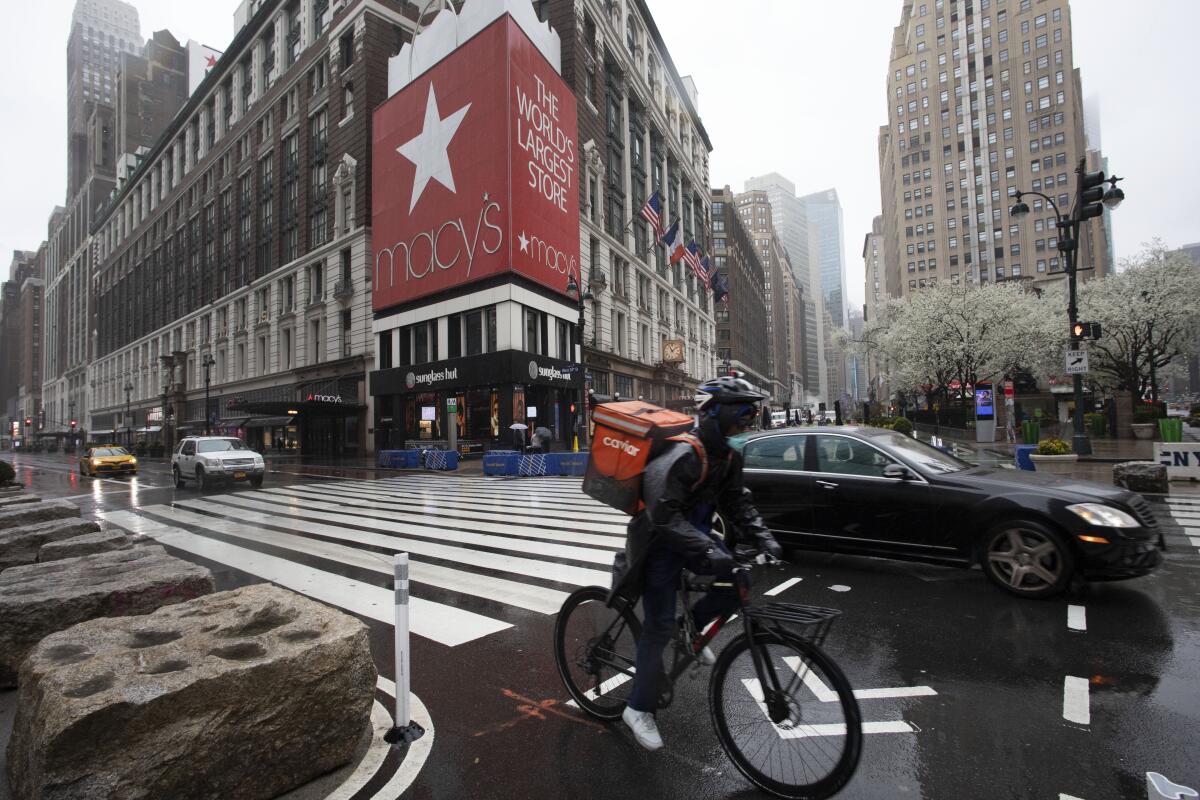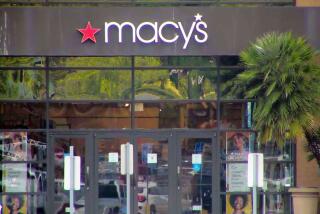Macy’s, Kohl’s and Gap are furloughing most of their workers

Macy’s Inc., Kohl’s Corp. and Gap Inc. all said Monday that they will stop paying hundreds of thousands of employees who were thrown out of work when the retail chains temporarily closed their stores and sales collapsed as a result of the coronavirus pandemic.
Macy’s said most of its 125,000 employees will be furloughed this week and that it is transitioning to an “absolute minimum workforce” needed to maintain basic operations. The department-store giant said it has lost the bulk of its sales due to the temporary closing of more than 600 stores starting March 18.
Kohl’s said the furloughs will apply to 85,000 of its 120,000 employees at stores and distribution centers. It will continue to ship products and do curbside pickup from most stores with a limited number of staffers.
A Gap spokesman said the furloughs affect nearly 80,000 out of 129,000 employees across all the clothing company’s brands, including Banana Republic and Old Navy.
The furloughed workers will continue to collect health benefits.
The furloughs are bad news for an economy in which the retail industry supports one out of four workers. They are also perhaps the most dramatic sign that even big-name retailers are seeing business evaporate and that the $2-trillion rescue package passed by Congress and signed by President Trump last week may have limited effect.
Nordstrom Inc. said last week that it was furloughing a portion of its corporate staff. Shoe company Designer Brands Inc., which operates DSW Designer Shoe Warehouse, furloughed 80% of its workers, effective last weekend. And according to Bloomberg, Neiman Marcus Group Inc. plans to furlough or impose temporary salary reductions on some staffers.
Analysts expect more furloughs to come as retailers scramble to pay their employees from fast-dwindling cash reserves. Labor is the single biggest monthly fixed cost for retailers, according to investment research firm Cowen & Co.
“This could push us further into a damaging recession that will last longer than the duration of the crisis,” said Neil Saunders, managing director of GlobalData Retail.
More than 190,000 stores, including JCPenney and Neiman Marcus, have temporarily closed, accounting for nearly 50% of U.S. retail square footage, according to Saunders. Discounters, grocers and wholesale clubs that sell essential items such as groceries remain open — and are scrambling as they try to keep up with shoppers who continue to stockpile canned goods, paper towels and other staples.
According to a recent report by Cowen & Co., department stores have enough cash to make it to about five to eight months with their stores temporarily closed. Macy’s and Kohl’s have enough for five months, Cowen said. J.C. Penney Co. and Nordstrom are better positioned, at eight months of available liquidity, according to Cowen.
When announcing the temporary closures, most retailers said they would keep paying their workers but were looking at a two-week timetable. Although those weeks have now passed, the closures have become increasingly necessary as the coronavirus rapidly spreads.
The big question is how many of these furloughs will lead to permanent layoffs. Rent the Runway, a pioneer in fashion rental, confirmed Monday that it was laying off its retail staff and said it may not be able to reopen its stores that temporarily shut this month. Its online subscription service continues to operate.
Swedish retailer H&M said this month it may be forced to permanently lay off some employees after temporarily shutting 3,441 of its 5,062 stores globally.
Coresight Research’s Deborah Weinswig forecasts a new record high of 15,000 stores closing this year, up from her original prediction of 8,000 — all because of the coronavirus. Analysts believe that already ailing companies with heavy debt loads may have to dramatically close more stores or be pushed closer to bankruptcy.
Even before the pandemic, traditional retailers, particularly department stores and mall-based clothing stores, had been struggling to reinvent themselves as shoppers shift more of their purchases online and embrace experiences such as cooking classes and subscription services. Now, the pandemic has forced people to stay home and clamp down on spending for non-essentials such as clothing.
Macy’s said there won’t be as many furloughs in its online operations, which continue to operate. Employees enrolled in health benefits will continue to receive coverage, with the company covering 100% of the premium.
“We expect to bring colleagues back on a staggered basis as business resumes,” Macy’s said.
To survive in the meantime, Macy’s, Kohl’s and others have taken steps to preserve their cash. That includes suspending their dividends, drawing down their lines of credit, freezing hiring and spending and canceling orders. Macy’s said Monday that it is evaluating all financing options.
More to Read
Inside the business of entertainment
The Wide Shot brings you news, analysis and insights on everything from streaming wars to production — and what it all means for the future.
You may occasionally receive promotional content from the Los Angeles Times.










